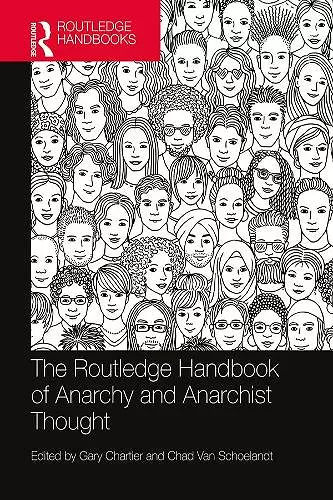The Routledge Handbook of Anarchy and Anarchist Thought
Gary Chartier editor Chad Van Schoelandt editor
Format:Paperback
Publisher:Taylor & Francis Ltd
Published:1st Aug '22
Currently unavailable, and unfortunately no date known when it will be back
This paperback is available in another edition too:
- Hardback£220.00(9781138737587)

This Handbook offers an authoritative, up-to-date introduction to the rich scholarly conversation about anarchy—about the possibility, dynamics, and appeal of social order without the state. Drawing on resources from philosophy, economics, law, history, politics, and religious studies, it is designed to deepen understanding of anarchy and the development of anarchist ideas at a time when those ideas have attracted increasing attention.
The popular identification of anarchy with chaos makes sophisticated interpretations—which recognize anarchy as a kind of social order rather than an alternative to it—especially interesting. Strong, centralized governments have struggled to quell popular frustration even as doubts have continued to percolate about their legitimacy and long-term financial stability. Since the emergence of the modern state, concerns like these have driven scholars to wonder whether societies could flourish while abandoning monopolistic governance entirely.
Standard treatments of political philosophy frequently assume the justifiability and desirability of states, focusing on such questions as, What is the best kind of state? and What laws and policies should states adopt?, without considering whether it is just or prudent for states to do anything at all. This Handbook encourages engagement with a provocative alternative that casts more conventional views in stark relief.
Its 30 chapters, written specifically for this volume by an international team of leading scholars, are organized into four main parts:
I. Concept and Significance
II. Figures and Traditions
III. Legitimacy and Order
IV. Critique and Alternatives
In addition, a comprehensive index makes the volume easy to navigate and an annotated bibliography points readers to the most promising avenues of future research.
"This splendid collection invites us to look at the idea of anarchy and anarchism from a remarkable range of perspectives: historical, anthropological, and economic, as well as political and philosophical. The individual essays are invariably insightful, often provocative, and sometimes surprising for what they tell us about how people have managed to order their collective lives without turning to political authority. The volume as a whole has as much to offer those familiar with anarchist traditions as others coming to these ideas for the first time."
Chandran Kukathas, Singapore Management University
"This Handbook surveys the history of anti-authoritarian answers to the basic questions of political philosophy. But the introduction and selections—notable for their clarity, precision, and expertise—also apply various forms of liberatory politics to concrete matters in the contemporary world, including climate change, mass incarceration, military technologies, and even transhumanism. The Handbook embodies a coherent, unified account of its subject-matter, demonstrating the continued relevance of a fundamentally challenging tradition. The provocations this potentially controversial volume offers, especially when protesters around the world are chanting ‘abolish the police,’ could not be more timely."
Crispin Sartwell, Dickinson College
"The history and prospects of anarchism are misunderstood—and often misrepresented. There is a renewed interest in questioning the size and function of the coercive state, and mistrust of attempts at reform is growing. Surprisingly, there have been very few attempts to take stock of this broad, and sometimes contradictory, body of thought. The Handbook is the right book at the right time. Scholarly enough to be used by philosophers and political theorists, it is also a delightful and intellectually challenging resource for anyone who wants to understand anarchism as a movement."
Michael Munger, Duke University
"This Handbook is an important and timely contribution to a vitally necessary discussion. New pressures on our inherited political institutions are distorting them in undesirable ways, whether these pressures come from climate change, from the growth of international corporate power, from truly global pandemics, or from globe-spanning terror networks. How can we arrange our political and social affairs such that they enhance human life while simultaneously avoiding or containing the horrific effects of inappropriate modes of organization? This volume offers a wide range of suggestions for our careful consideration."
Jack Sanders, Rochester Institute of Technology
"Too much contemporary political philosophy still pays too little attention to anarchist thought. That neglect has always been surprising, not least because no other body of literature so comprehensively explores and challenges the theoretical and empirical foundations of coercive forms of hierarchy and their associated conceptions of justice and authority. Nowhere is the breadth and analytical depth of the anarchist tradition better represented than in the contributions to this Handbook."
Hillel Steiner, University of Manchester
ISBN: 9780367645786
Dimensions: unknown
Weight: 802g
460 pages